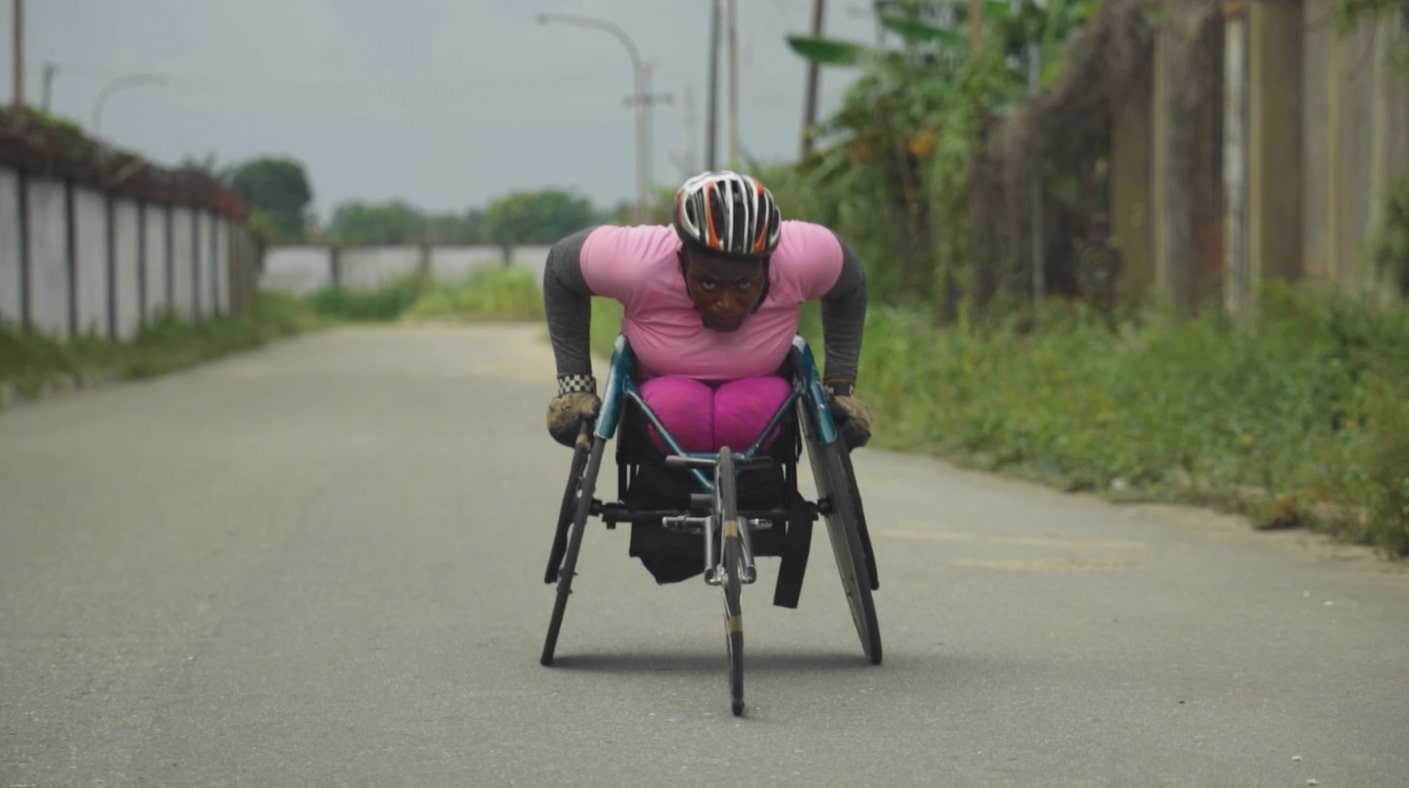Olajumoke's story
Olajumoke’s quote – "Lagos keeps growing, and in this city, millions of people search for opportunities every single day. And there are so many of us who live in poverty, and we, those with disabilities, are at the bottom." - Olajumoke Olajide, 26, is an athlete.
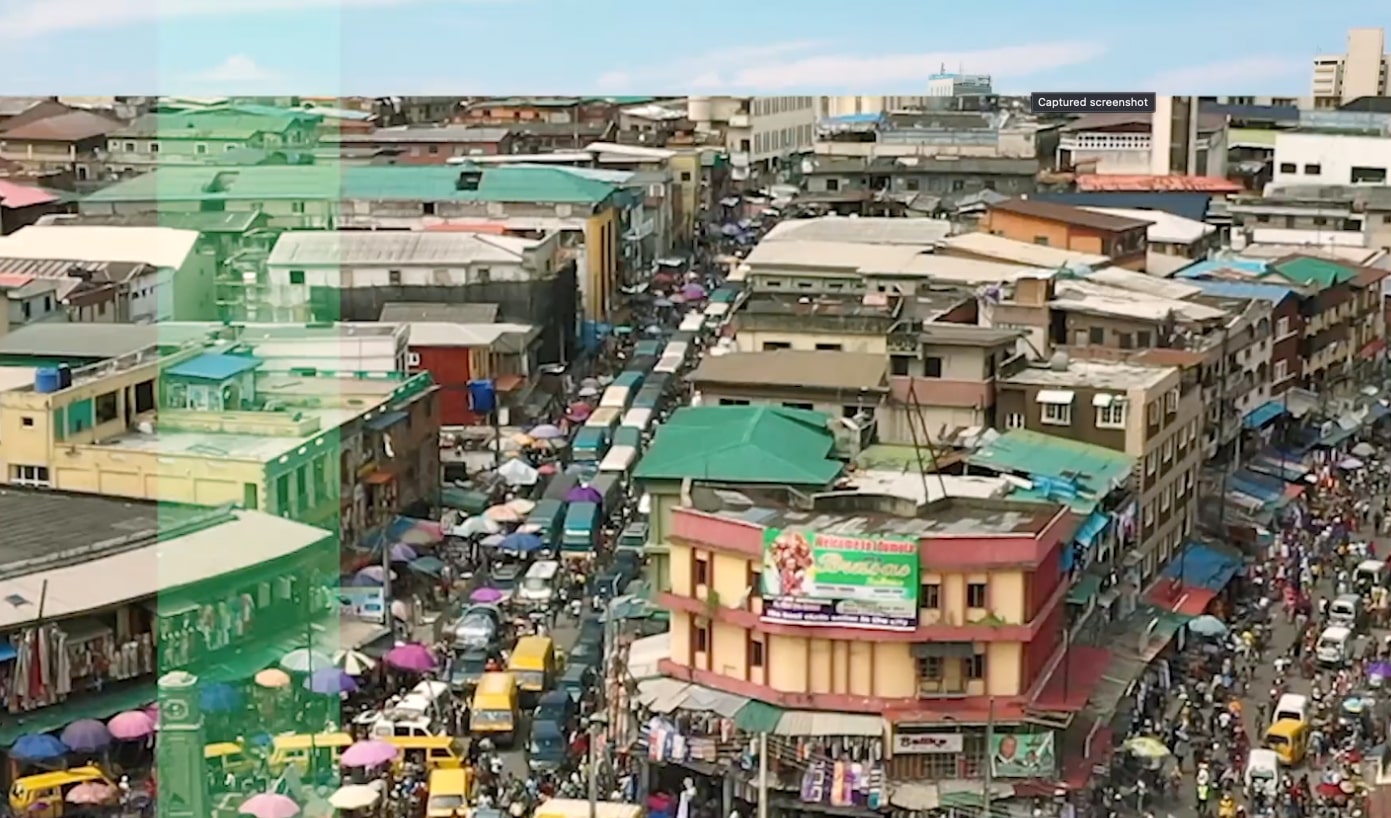
Olajumoke holds the African record in the women’s 100m wheelchair race.
She also plays tennis and is a member of the women’s wheelchair basketball team.
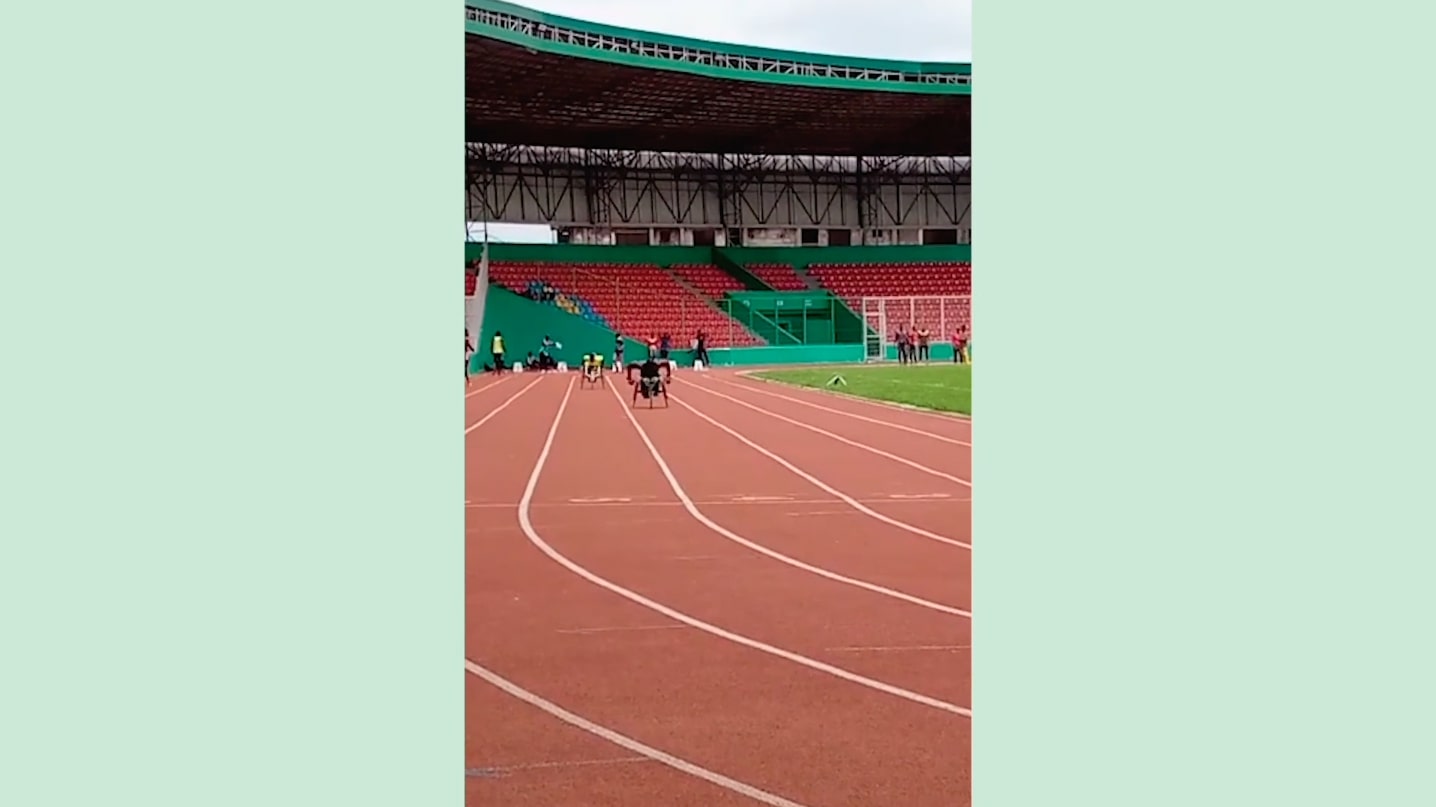
Disabled and excluded in Nigeria, Africa’s largest economy
Of the UN’s estimated 80 million people with disabilities in Africa, around 25 million are in Nigeria—that’s almost one-third. But the official numbers in Nigeria and the African continent vastly underreport the actual number of disabled people.
Of all the people with disabilities in the world, 80% live in developing countries. And they are all disproportionately more likely to live in poverty. Also, disabilities are more common among women and the elderly.
In the end, people with disabilities lack access to education, healthcare, employment, housing and systems of social protection. Many of them face discrimination and violence.
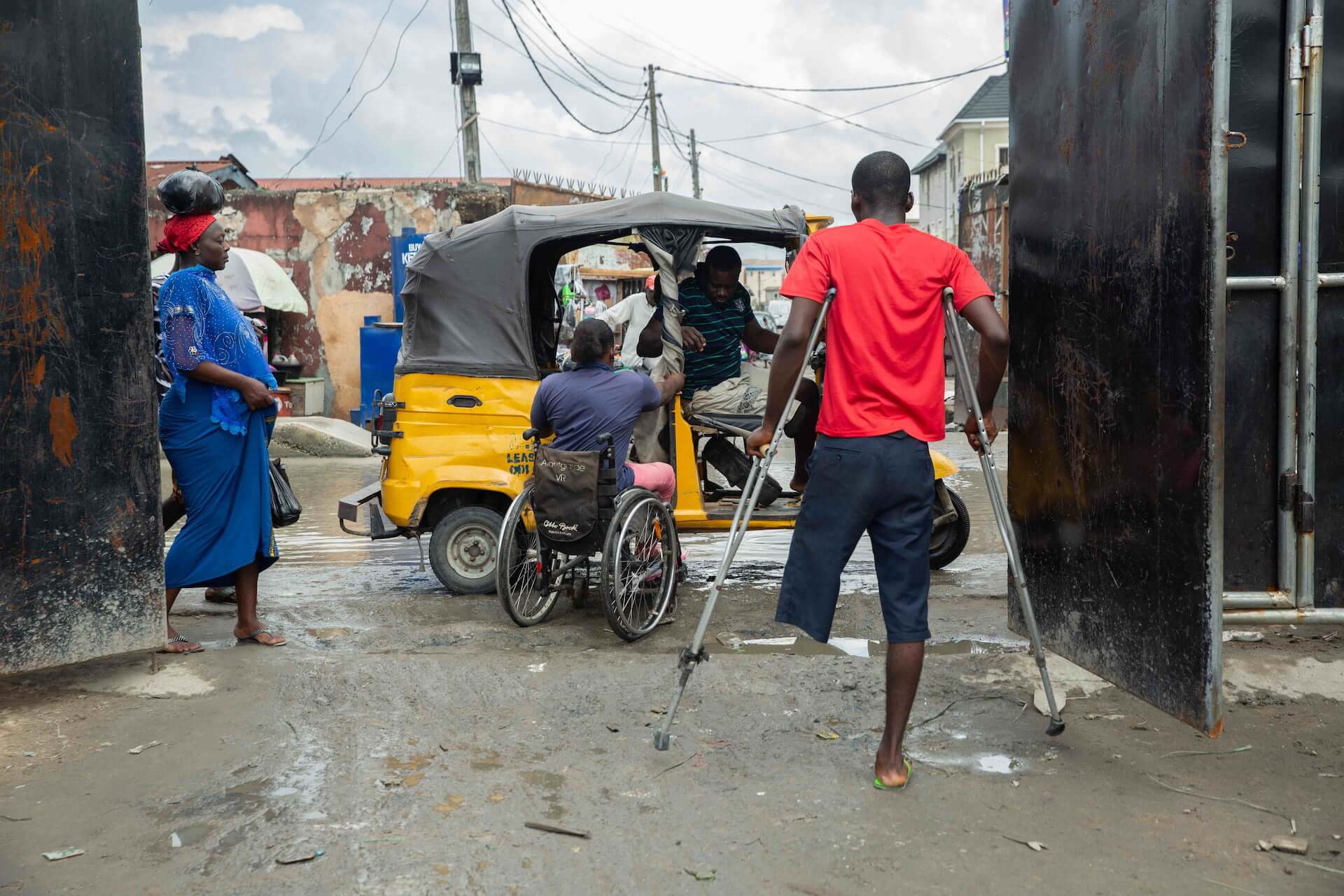
The triple curse: poverty, marginalisation, no support
In Nigeria, 40% of people live below the poverty line (137,430 naira per year, or $382)—that’s almost 83 million people. And it’s people with disabilities who suffer the most. They account for nearly one-third of people living in poverty.
Unemployment is bad, too. The jobless rate for adults with disabilities is 62.5% compared to 21.5% for able-bodied adults.
Disabled people also receive very little support from the government. They rely on family, NGOs and religious groups. Only one state in Nigeria—Jigawa in the northwest—provides social security to someone with a disability. It works out to 7,000 naira ($17) a month.
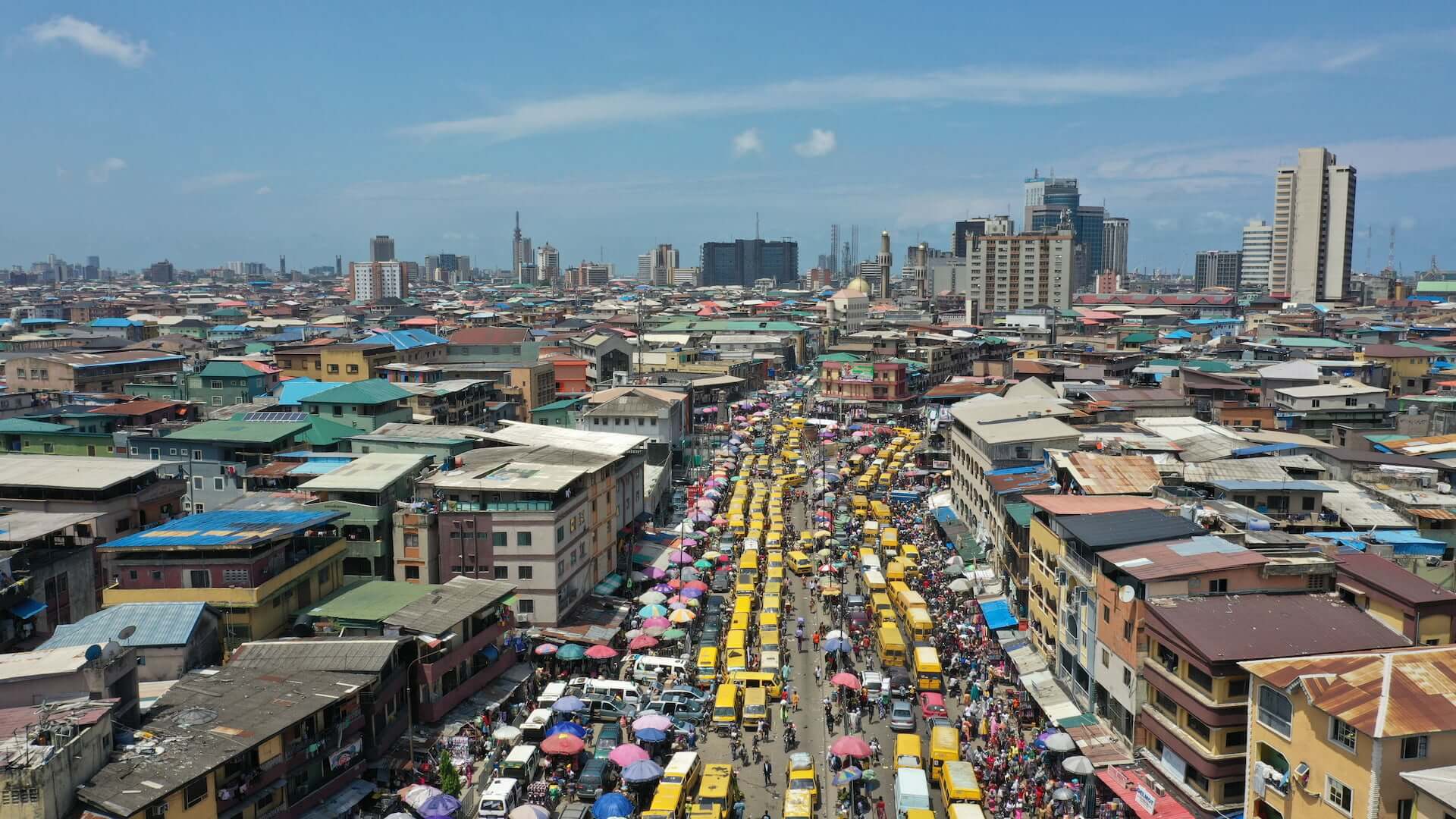
Olajumoke’s disability
Because of polio, Olajumoke lost the use of her legs when she was about 5 years old.
She finished primary school but didn’t continue her studies because the school was far, and she didn’t want to be a financial burden on her parents.
The way I would put the condition the way that people look at me is different from the way I’m looking at myself. I don’t look at myself as a disabled person. If you ask me to do something, I do normal things women do. I do housework, I cook, I do everything but I don’t take myself as a disabled person.
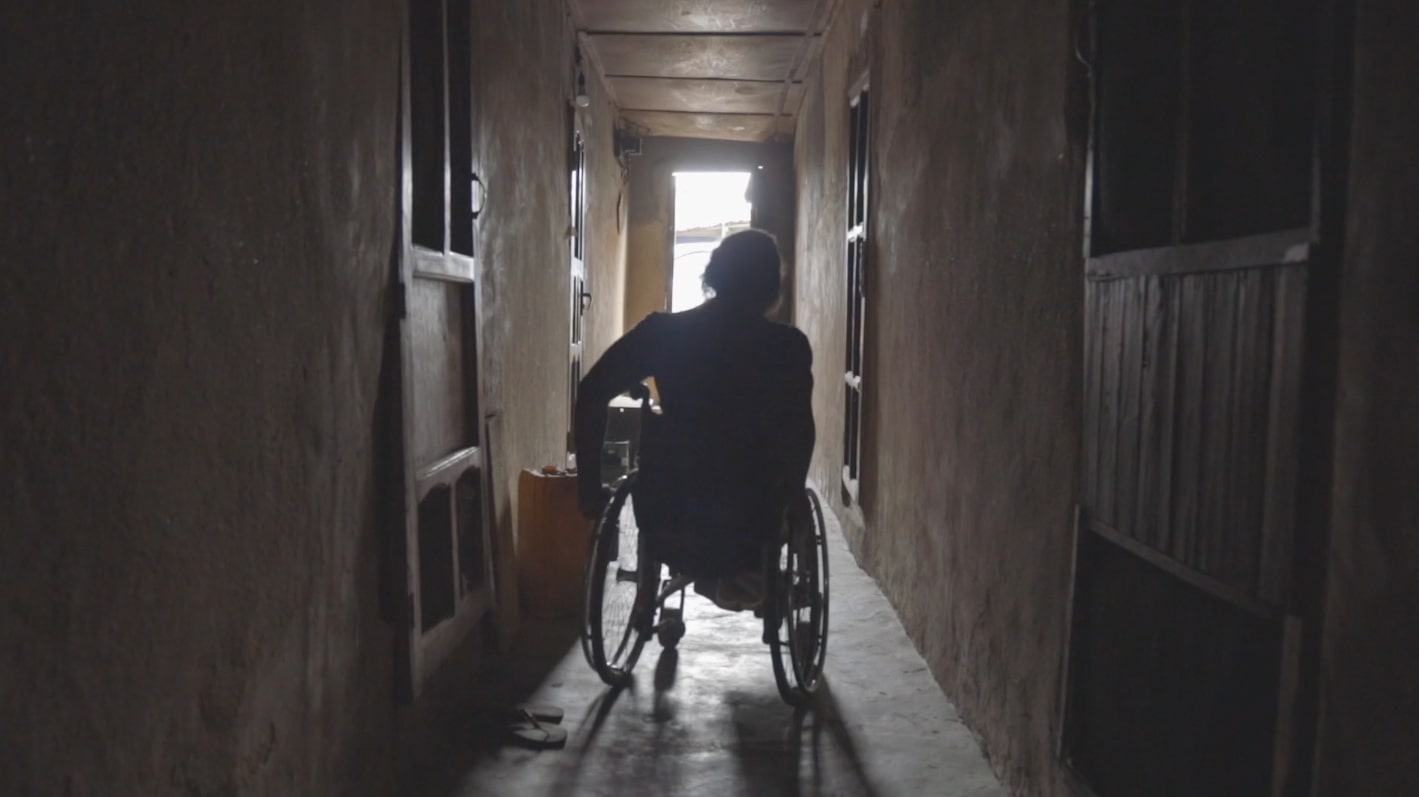
Megacity, meager access
With 15 million people, Lagos is Africa's largest city, where people compete for space on roads congested with oil tankers, cars, bikes and tricycles. The average person spends at least two hours stuck in traffic every day.
Roads in Lagos were not built to accommodate the current volume of traffic . A 5km (3.1 miles) trip could take an hour. Because there are few railways in Nigeria to move petroleum products, most are transported by road. Additionally, there is little provision made for the draining of surface water when it rains, and roads are in need of frequent repair.
Furthermore, the city doesn't have a train or subway system, and public transport is highly unreliable.
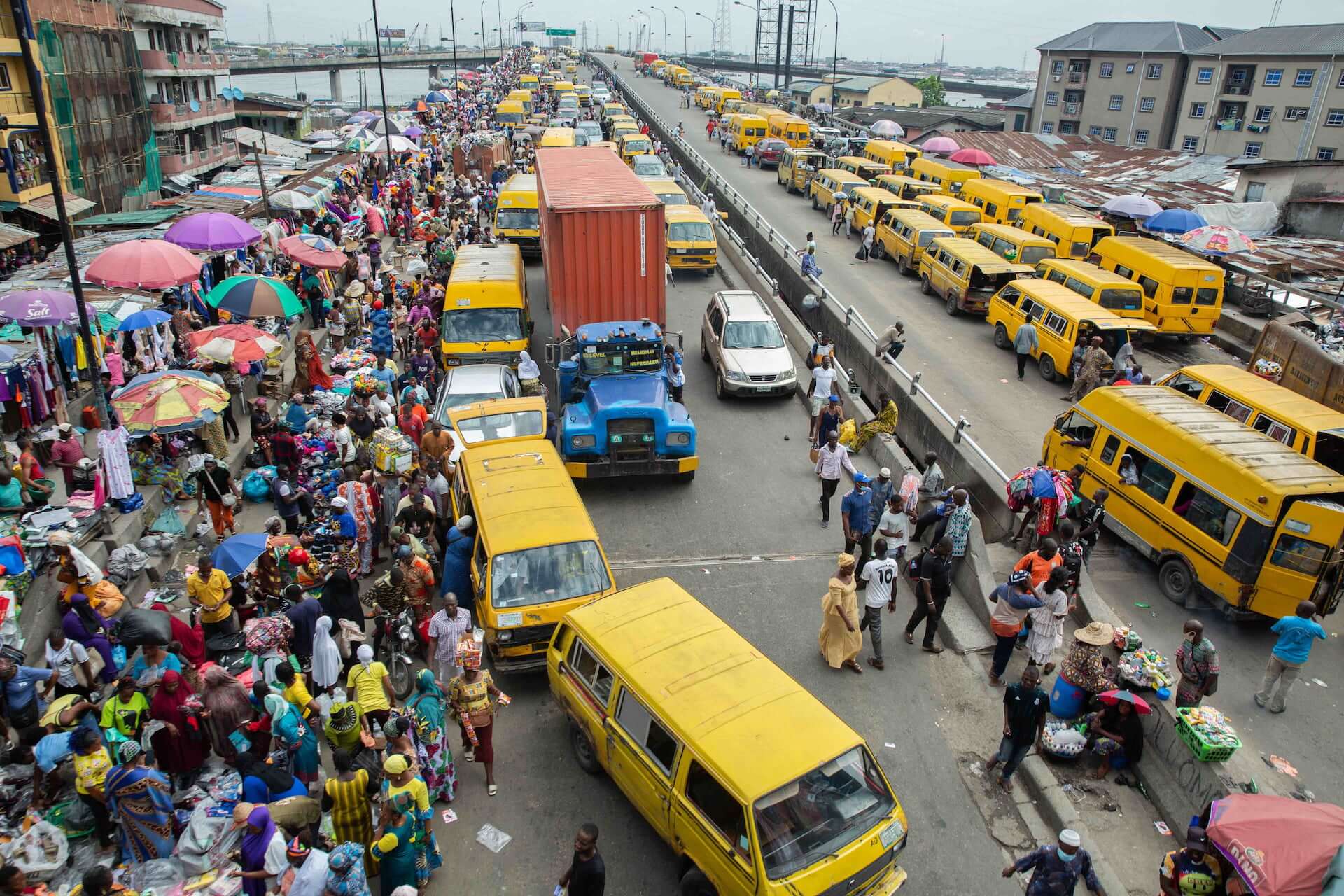
Falling into an open drain
A personal account of Kelechukwu Ogu, a blind journalist from Lagos
“Turn left, turn right, now go straight,” came a babble of directions. I had just picked myself out of a drainage filled with murk. I was wearing my favourite piece of short-distance clothing—red shorts with three pairs of pockets down the sides and back—for the last time. No one came to hold my filthy hands to lead me back home. The onlookers dodged traffic and continued their journey.
This was 16 years back. I have slipped my limbs into Lagos’ open drainages a few more times since then, but that was the only incident when all of me went in.
My interaction with open drainages and the fear of being knocked down by a bike or car has trained me to endure hunger and deprivation, while waiting for a sibling or neighbour to help me make purchases. To the left or right of many blocks in my street are uncovered gutters. Parked beside these drainages are vehicles. This setting fills me with anxiety that one trip to a shop could create an unpleasant scene.
What options do disabled people have?
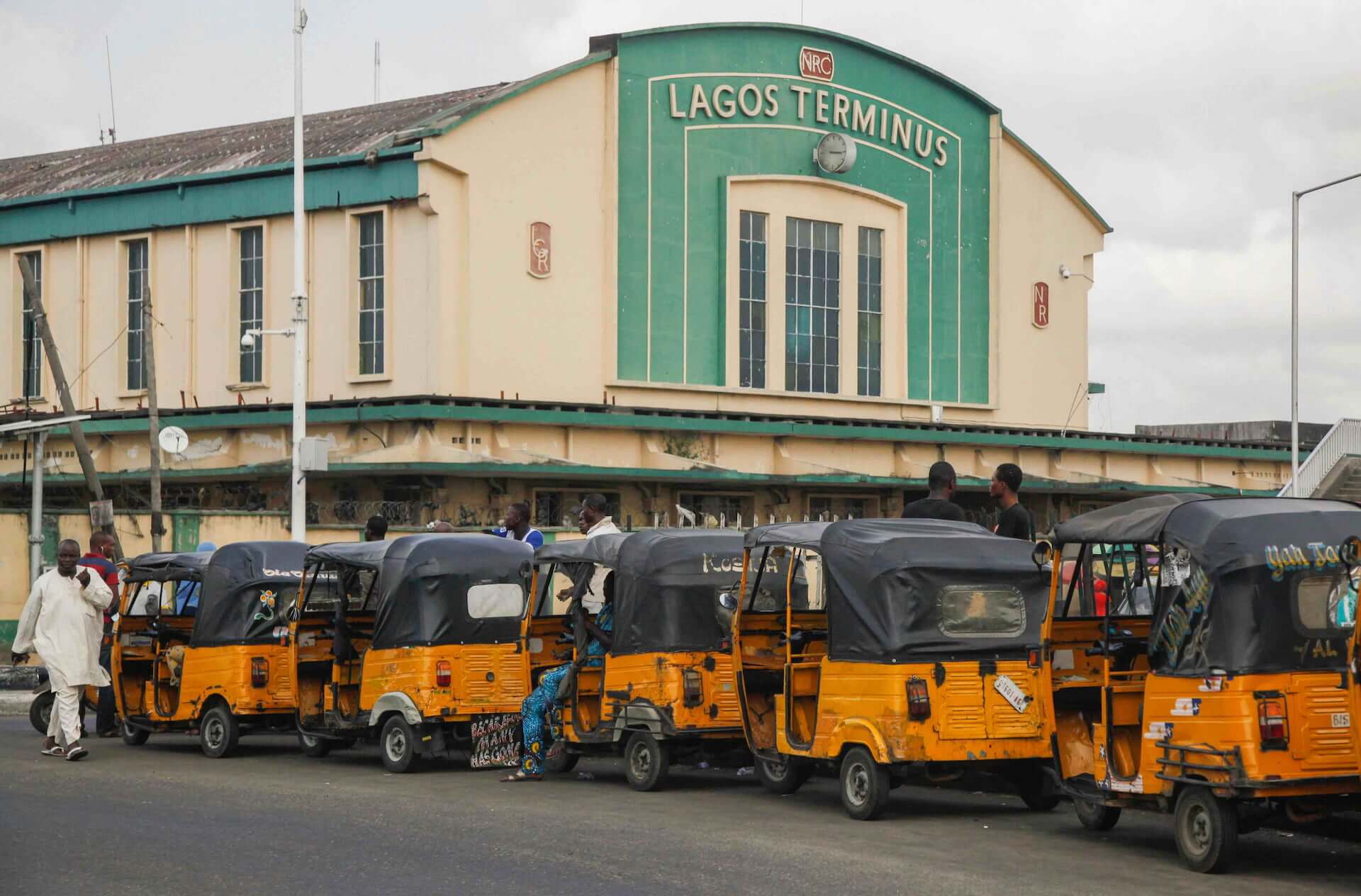
Launched in 2008, the publicly regulated Bus Rapid Transit (BRT) runs on more than 26 routes in Lagos. Alternatively, privately operated danfos are not regulated by the government. These are 20th century, 14-seater vehicles with outdated fume-emitting engines and chairs without padding on the seats and backrests.
- BRT buses, initially, had no mobile ramps to help wheelchair users board. They are now being phased out and replaced by vehicles with a single sloped step that is more convenient for wheelchair users.
- There are big, 50-seater-plus BRT buses, medium 30-seater sized ones, and small models described as “last mile”. Of these three types, only the big one provides space for wheelchair users to park their wheelchairs without disturbance from other passengers.
- For wheelchair users to comfortably roll in, the bus would have to park close to the kerb. But not all kerbs have ramps for disabled passengers to roll to the entrance of the bus.
- Staff are often not trained to help disabled people board the bus.
- If a wheelchair user prefers to use the last-mile buses, which are popular on short routes, they have to depend on an attendant to store the wheelchair in the boot – a service they do not appear mandated to provide.
- Most of the BRT buses do not announce the stops, which makes it nearly impossible for the visually impaired to locate themselves.
- Disabled people have to spend additional money to arrive at the bus station. They have to charter a cab or tricycle to take them to the bus stop.
- The privately-operated danfos are not regulated by the government. They run their flexible, always-on-the-go service with two attendants: a driver and a conductor. Sometimes, the driver goes solo. Disabled people who choose this service depend on the grace of the conductor or driver because they determine who to transport and what help to provide.
Motorbikes (okada) and three-wheelers (keke) weave between trucks, squeeze past traffic and drive freely on pavements. They can be convenient because they are able to pick up people at home and drop them off at their destination. A person can call a driver and strike a deal. But they are not suitable for everyone.
- Bikes aren’t suitable for wheelchair users. Even tricycles are inconvenient because they don’t have enough storage space. Olajumoke, for example, places her wheelchair on her lap and has to endure back pain because of it. Also, she has to pay for an extra seat or charter the service by paying for all the seats.
- They can be more expensive than buses, especially if you need to pay for an extra seat or for the entire vehicle.
- It is common for drivers to refuse rides based on fare or destination, so it becomes an added challenge if you’re disabled and need assistance from the drivers.
- Another issue is the legality of bike services. The Lagos state government has tried twice—in 2012 and 2020—to restrict the operation of motorcycles and tricycles, without providing alternatives.
There are e-hailing vehicles and regular cab operators. This service is for people with a regular income.
- A 40km (25 mile) trip with Bolt or Uber costs around 5,000 naira or $12. This option is not feasible for all, especially since many disabled people live on less than $32 a month.
- Drivers are not trained to assist people with disabilities. Some drivers refuse to help wheelchair users put their device in the boot. Some cancel the ride when they see the passenger is in a wheelchair.
- App-based car services remain largely for the privileged. They are inaccessible to those without a smartphone.
OLAJUMOKE’S COMMUTE
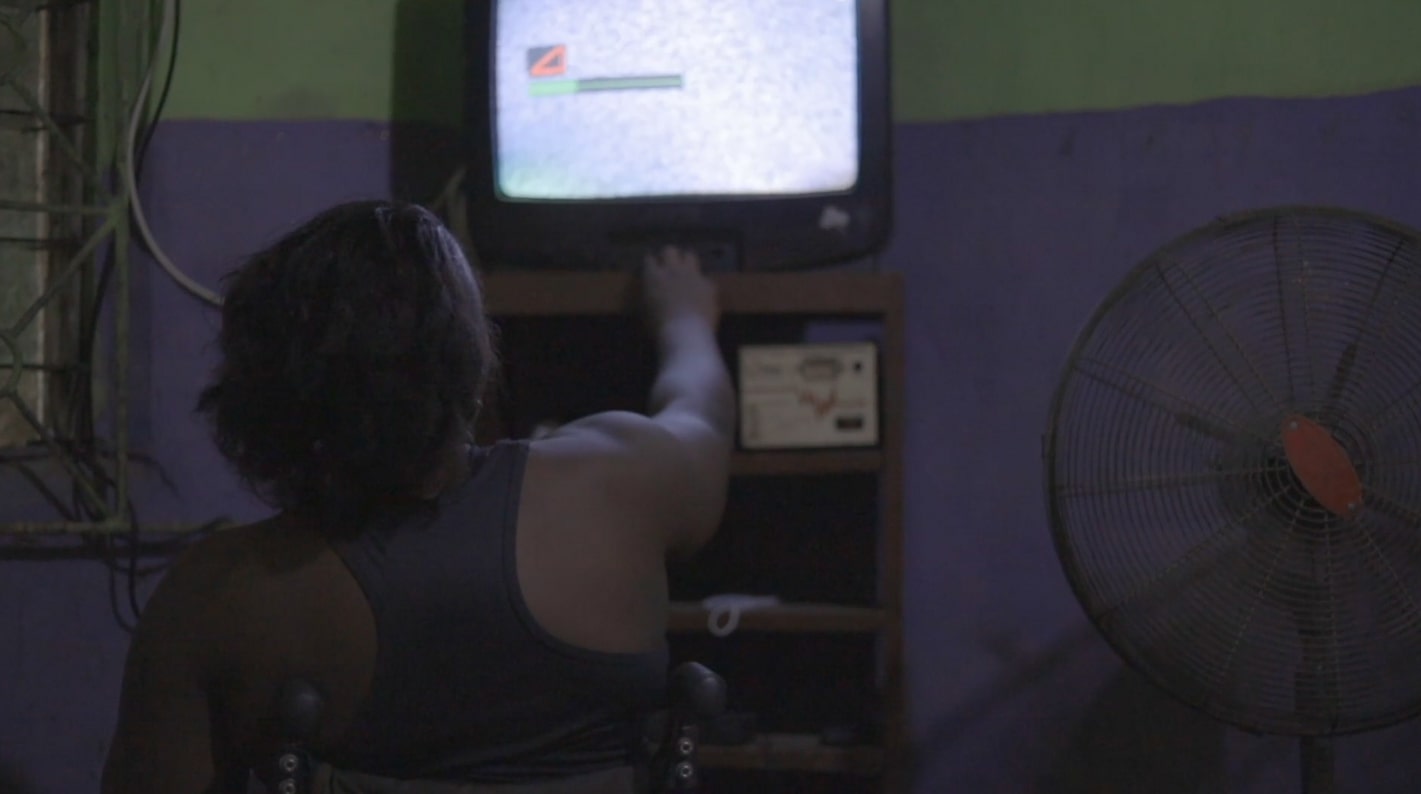
Olajumoke's family
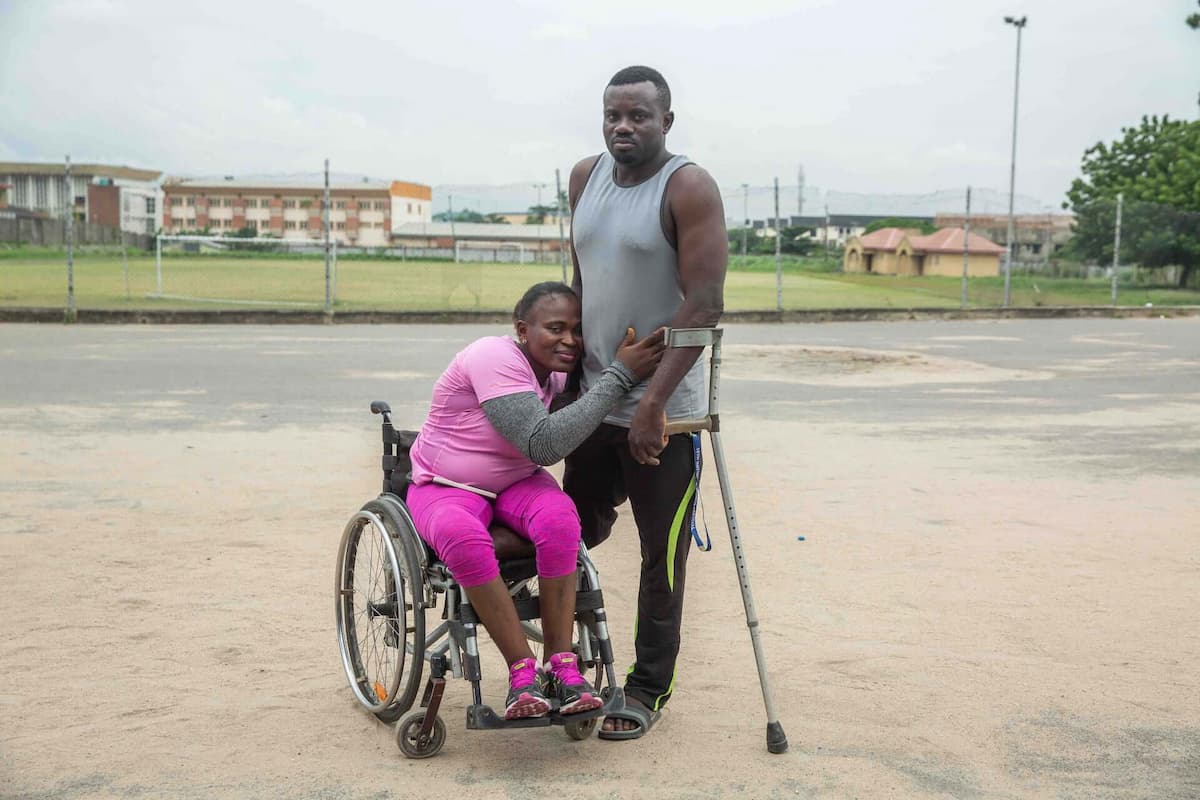 Olajumoke met Suraju at the stadium. They connected over sports and the challenges they face as people with disabilities. They are now engaged. Suraju plays amputee football and other sports but also drives a taxi or a tricycle to make money.
Olajumoke met Suraju at the stadium. They connected over sports and the challenges they face as people with disabilities. They are now engaged. Suraju plays amputee football and other sports but also drives a taxi or a tricycle to make money.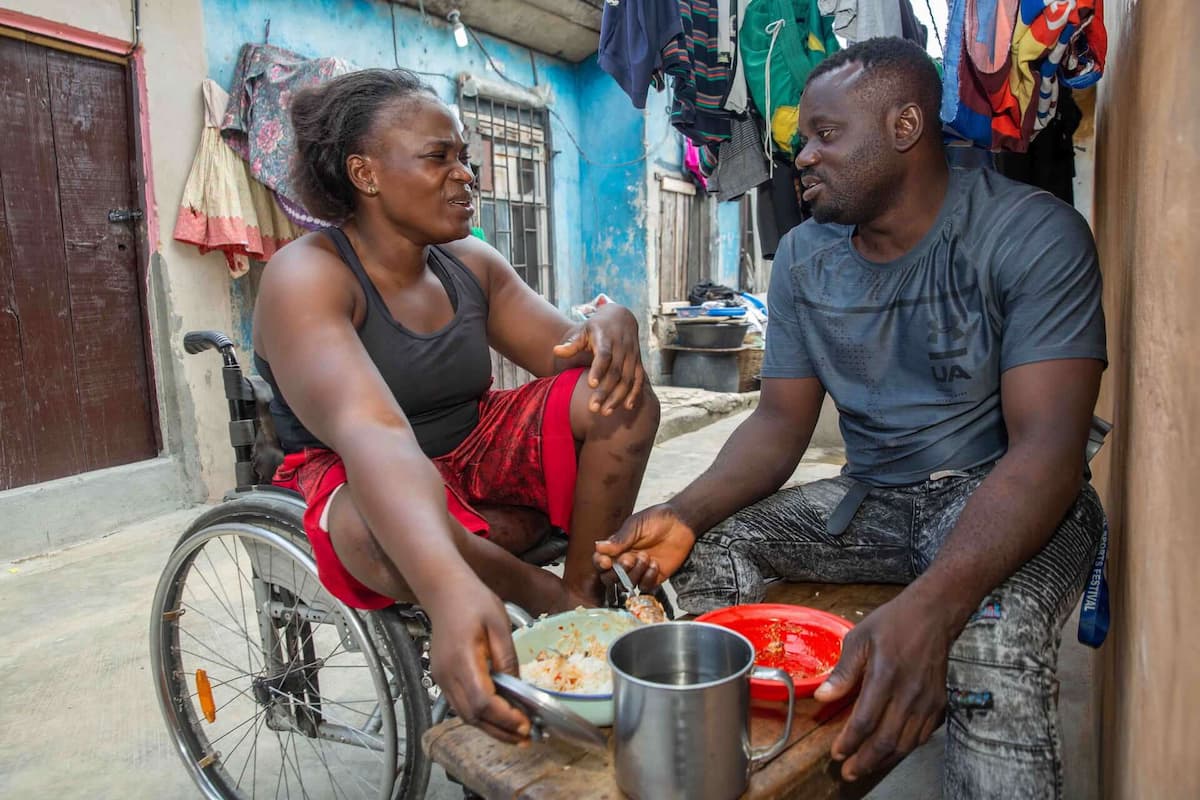
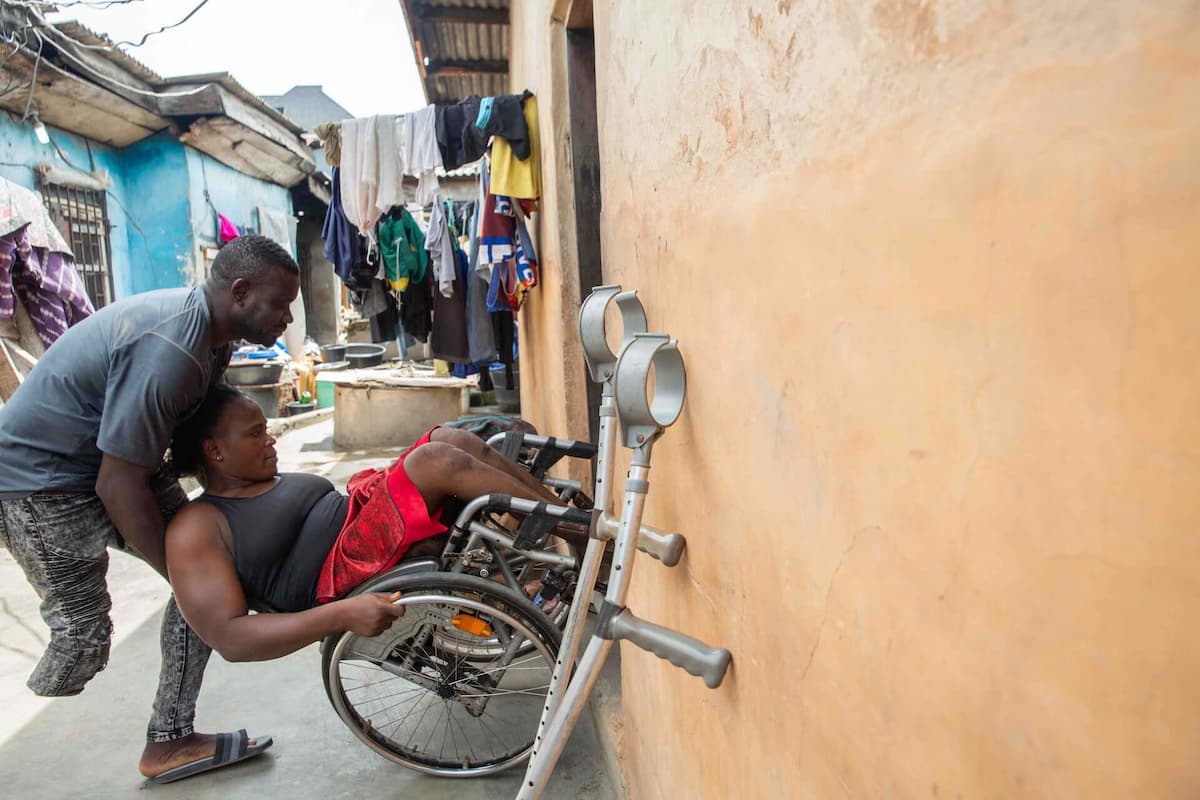 When moving around her house with steps and stairs, Olajumoke relies mostly on her fiancé or her family, especially her brother. If no one is there to help, she gets down from the wheelchair and crawls up the stairs.
When moving around her house with steps and stairs, Olajumoke relies mostly on her fiancé or her family, especially her brother. If no one is there to help, she gets down from the wheelchair and crawls up the stairs. 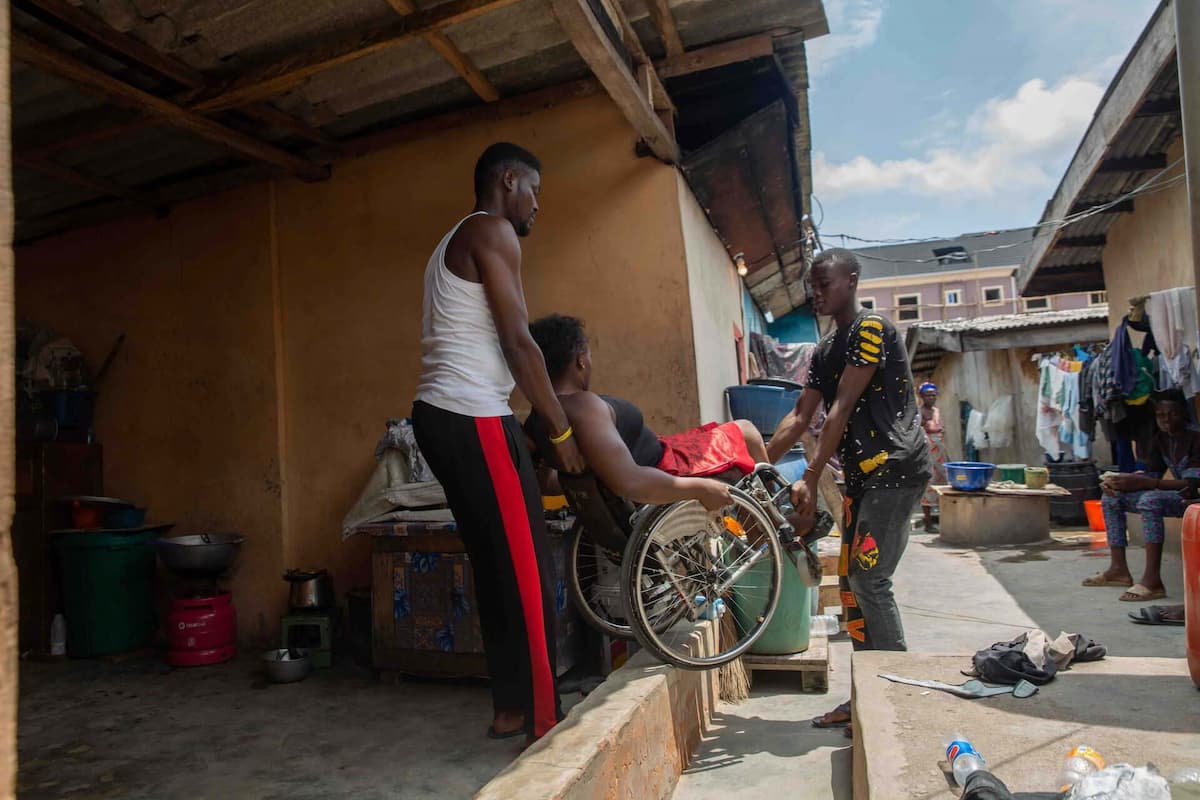
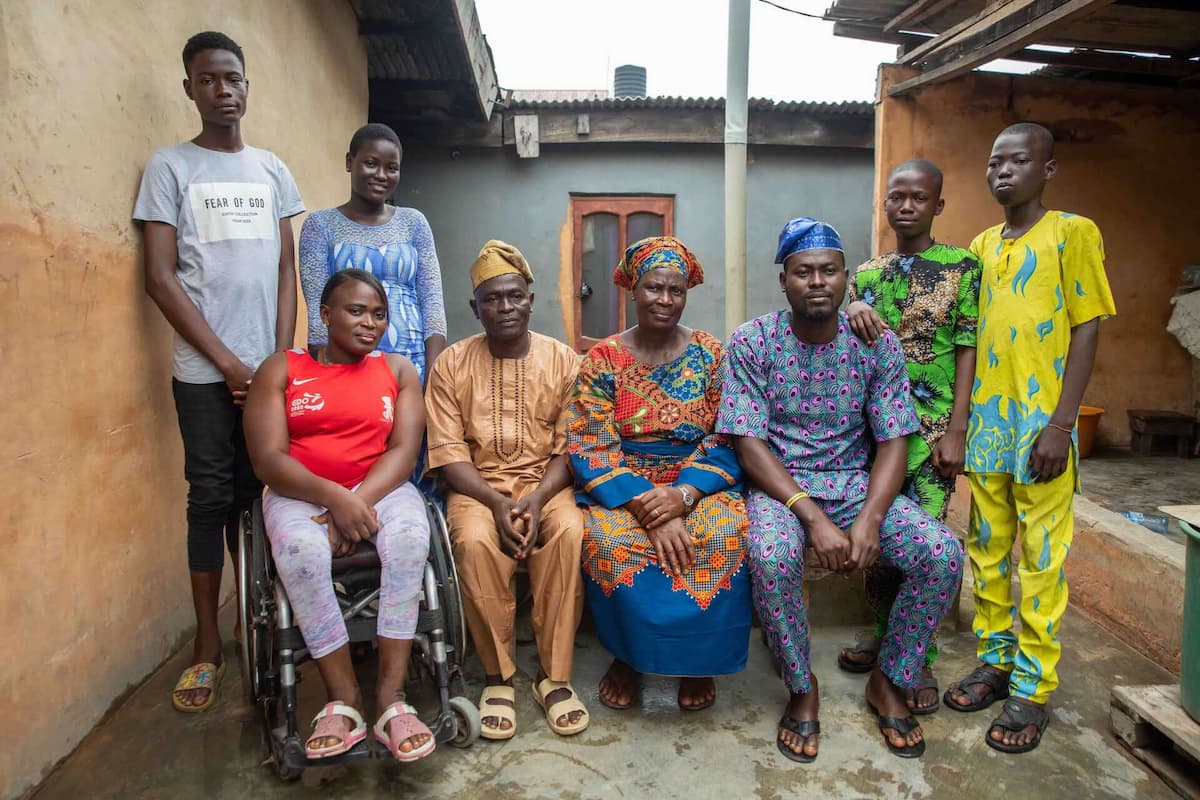
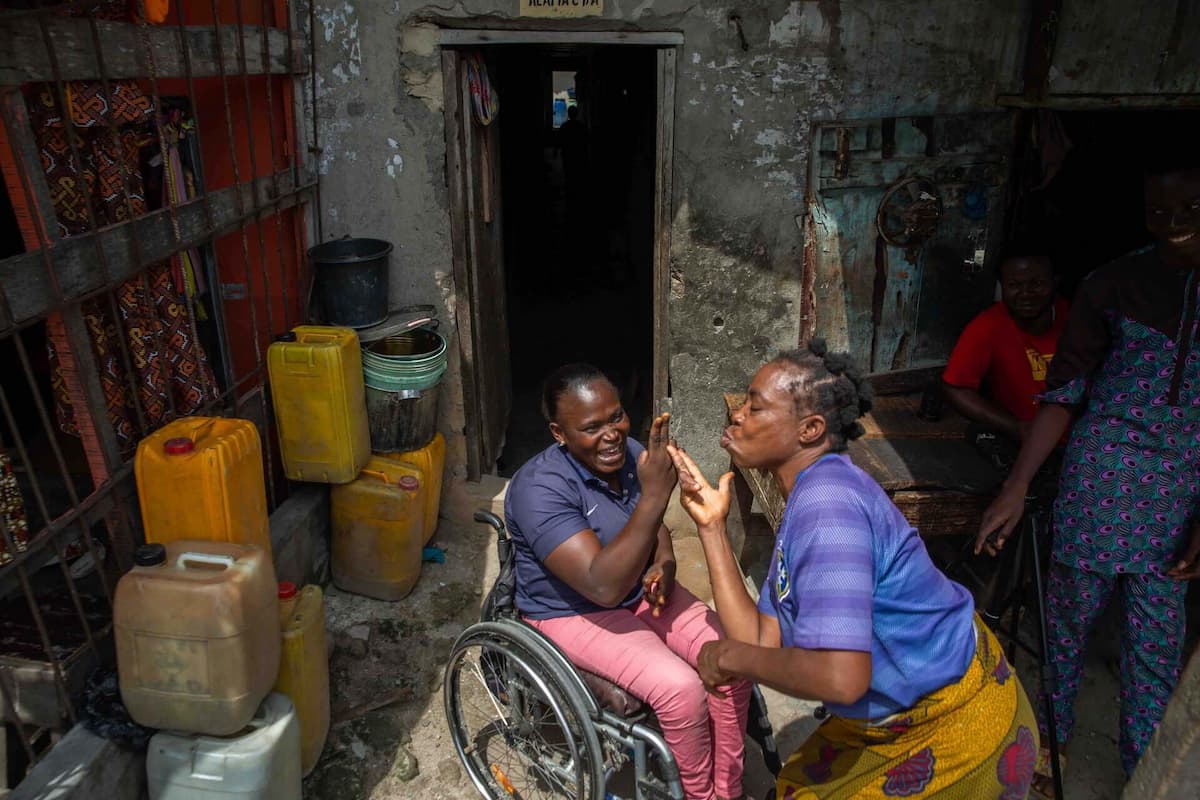 Olajumoke’s quote – "I like hanging out with my neighbours. I also love cooking. My favourite meal to prepare is Efo riro [Nigerian vegetable soup] and semo [semolina cakes]."
Olajumoke’s quote – "I like hanging out with my neighbours. I also love cooking. My favourite meal to prepare is Efo riro [Nigerian vegetable soup] and semo [semolina cakes]." 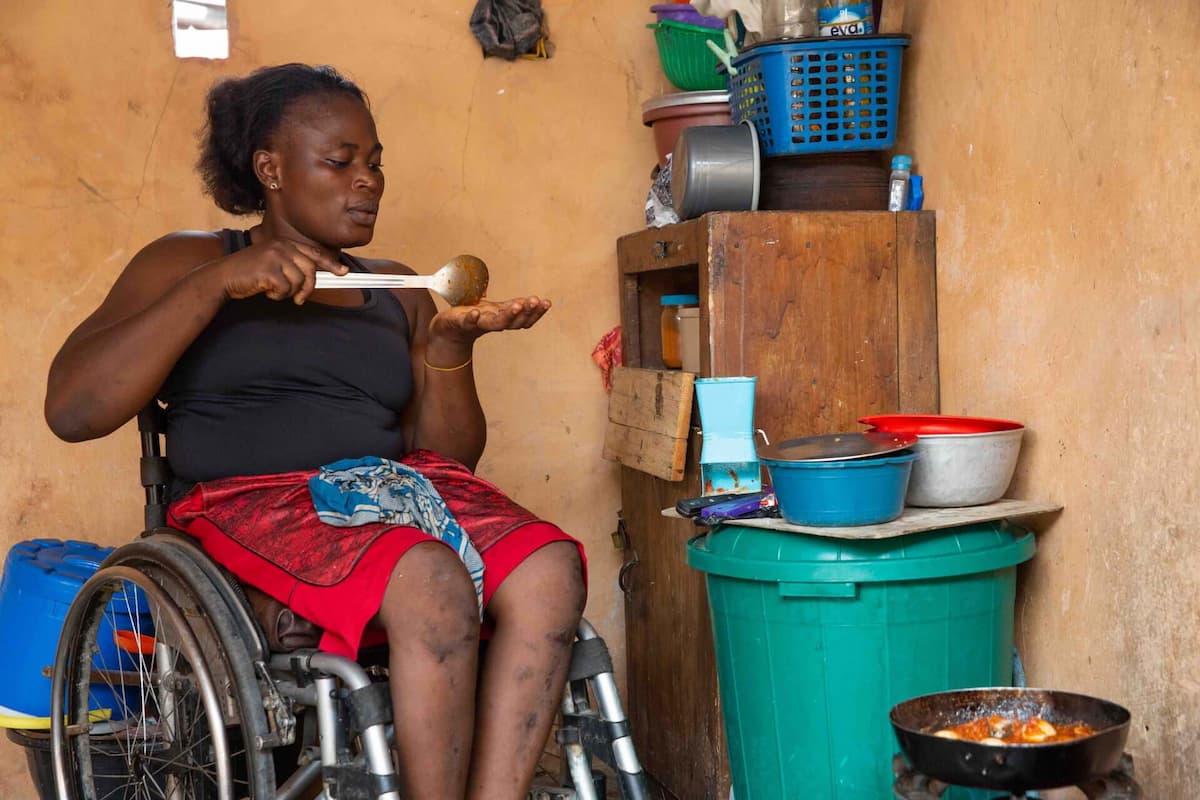
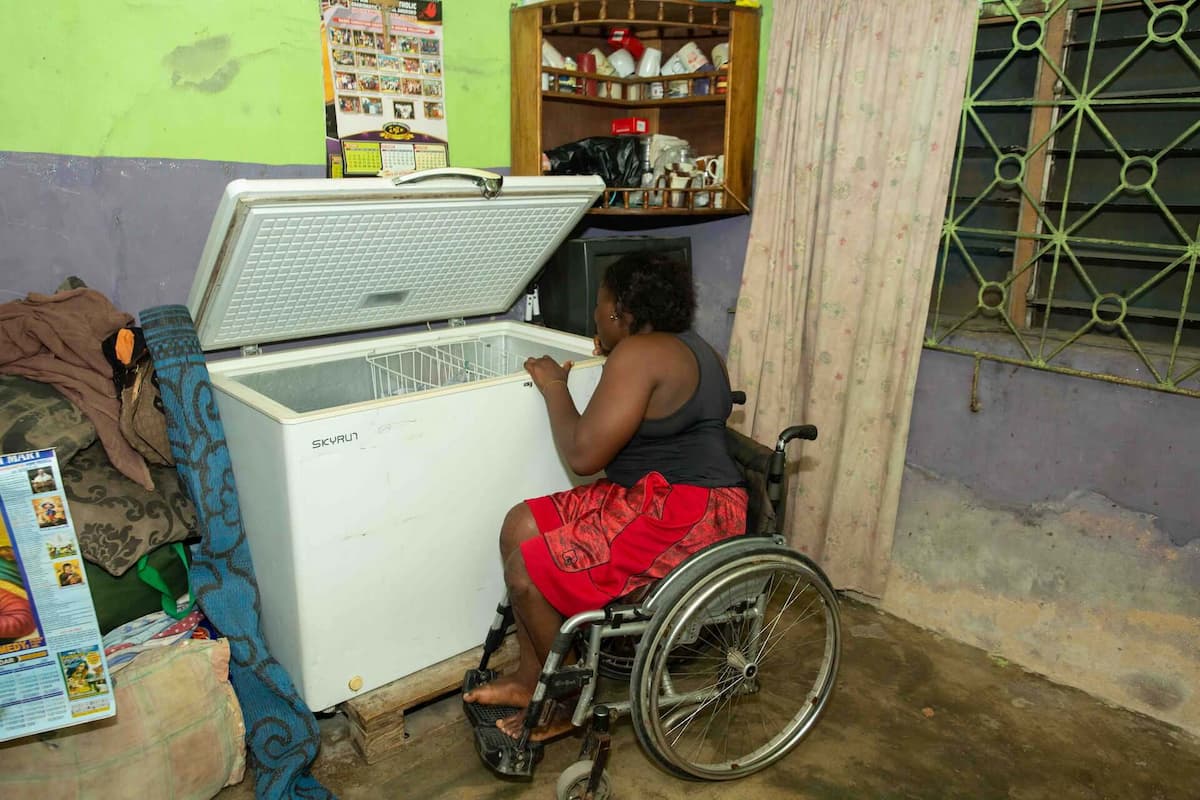
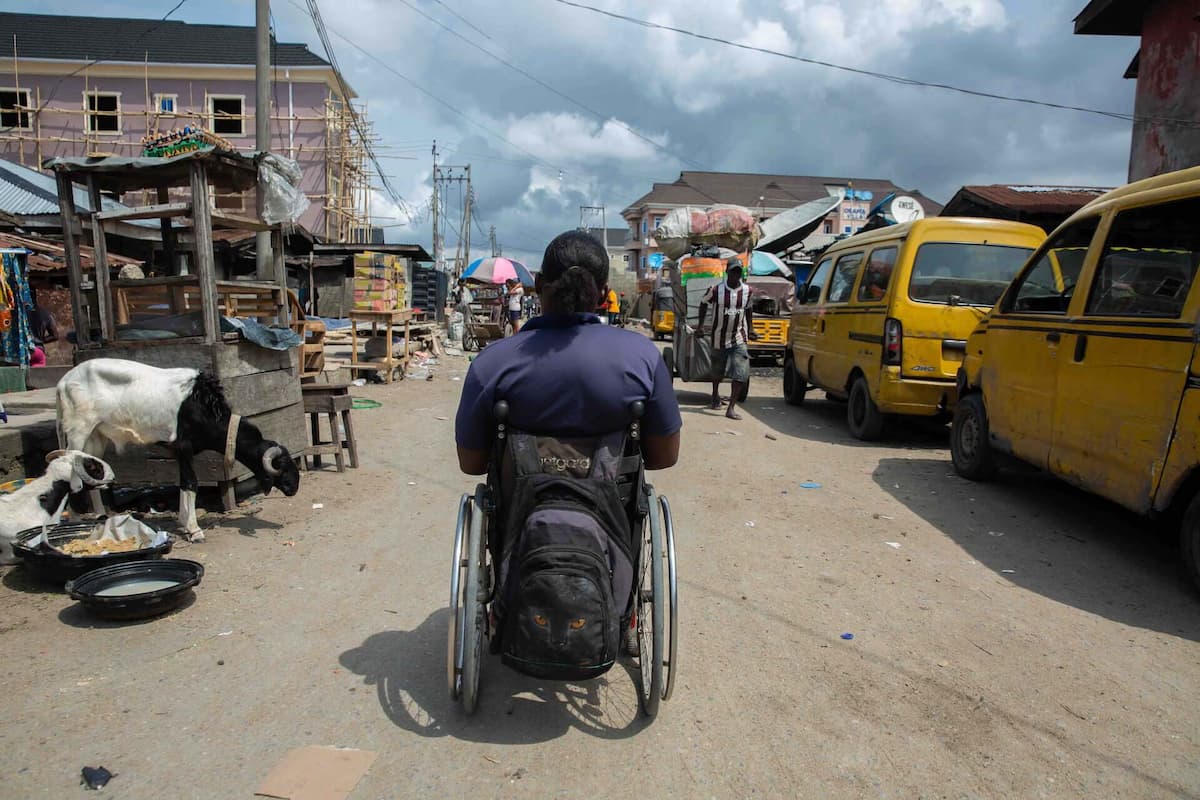
OLAJUMOKE ON ABUSE
Olajumoke's quote - "We all don’t have the same disabilities. Hence, some people get abandoned by their parents. Some, their fathers run away and rain curses on their mothers for bringing them into the world. Some people with disabilities are being treated like dogs. Some can’t even leave their own homes while some are completely ignored. There are so many challenges as some are even seen as ‘forbidden’.”
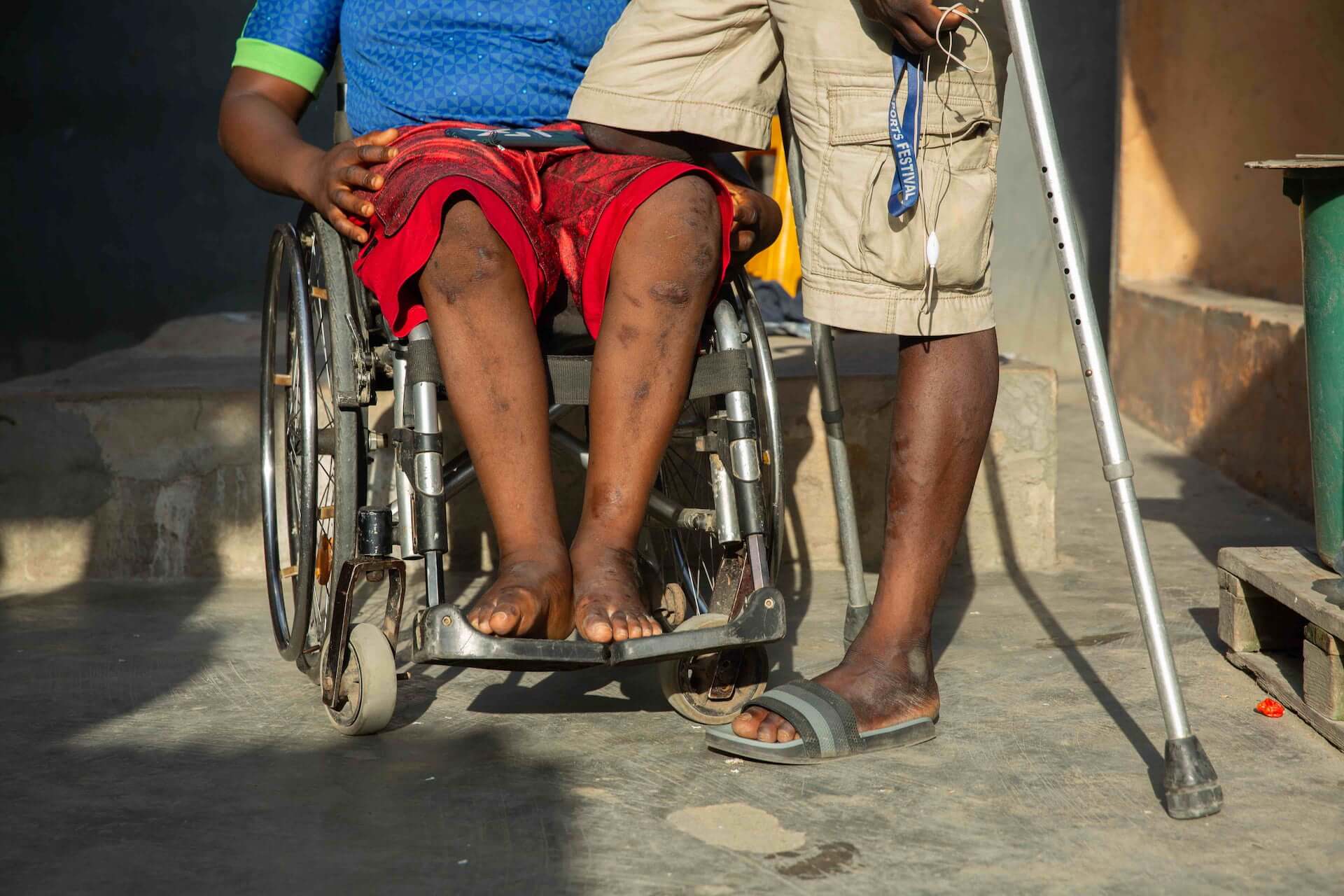
Disability worsened by negative attitudes and beliefs
In addition to the lack of access to public spaces and transport, disabled Nigerians also have to deal with social stigma. This leads to their mistreatment, including verbal and sexual abuse, and discrimination when it comes to employment.
Religious and cultural beliefs, usually stemming from low literacy, fuel the stigma. In Nigeria, a disability is sometimes considered a supernatural consequence of evil or witchcraft, causing disabled people to be ostracised or abandoned. People also stereotype disabled people as beggars, and often think of their disability as being contagious on physical contact.
The situation is worse for women with disabilities. They are 10 times more likely to experience domestic violence, abuse and sexual assault.
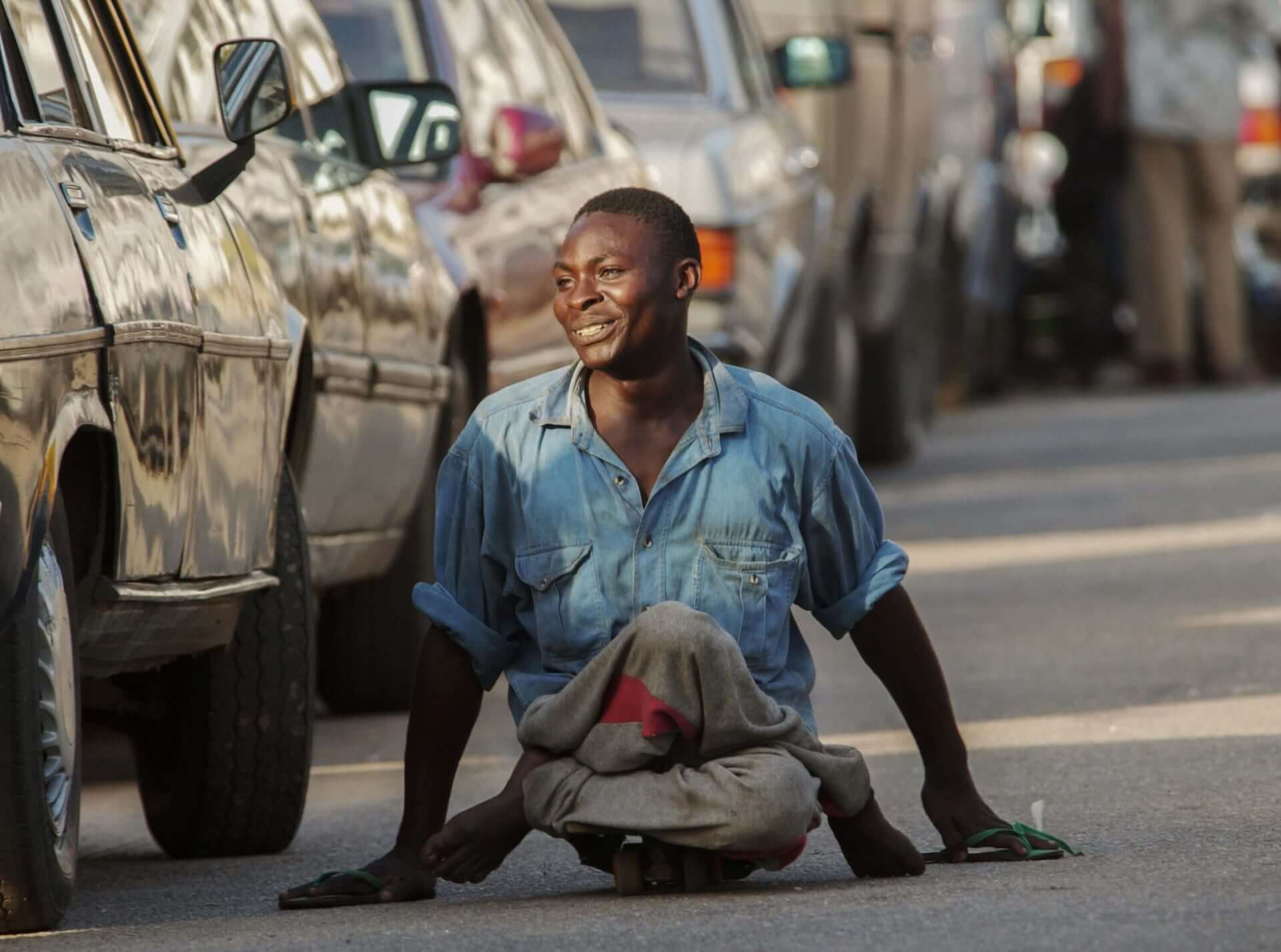
Are there any laws that protect disabled Nigerians?
On January 17, 2019 Nigerian President Muhammadu Buhari denied on national television that he had received a disability bill for his authorisation. Hundreds of people protested, and six days later he signed into law the Discrimination Against Persons with Disabilities (Prohibition) Act, after years of relentless advocacy by disability rights groups and activists.
The Act “provides for the full integration of persons with disabilities into the society, and establishes a National Commission for Persons with Disabilities, and vests the Commission with responsibilities for their education, healthcare, social, economic and civil rights.”
The law also prohibits discrimination based on disability while imposing fines and prison sentences on those who break it. It also stipulates a five-year transitional period for modifying public buildings, structures, and automobiles to make them accessible. Passing the Act was only the first step in fulfilling Nigeria’s commitment to the United Nations Convention on the Rights of Persons with Disabilities, which the country ratified in 2007. To what extent Nigeria will implement the Act is yet to be seen.
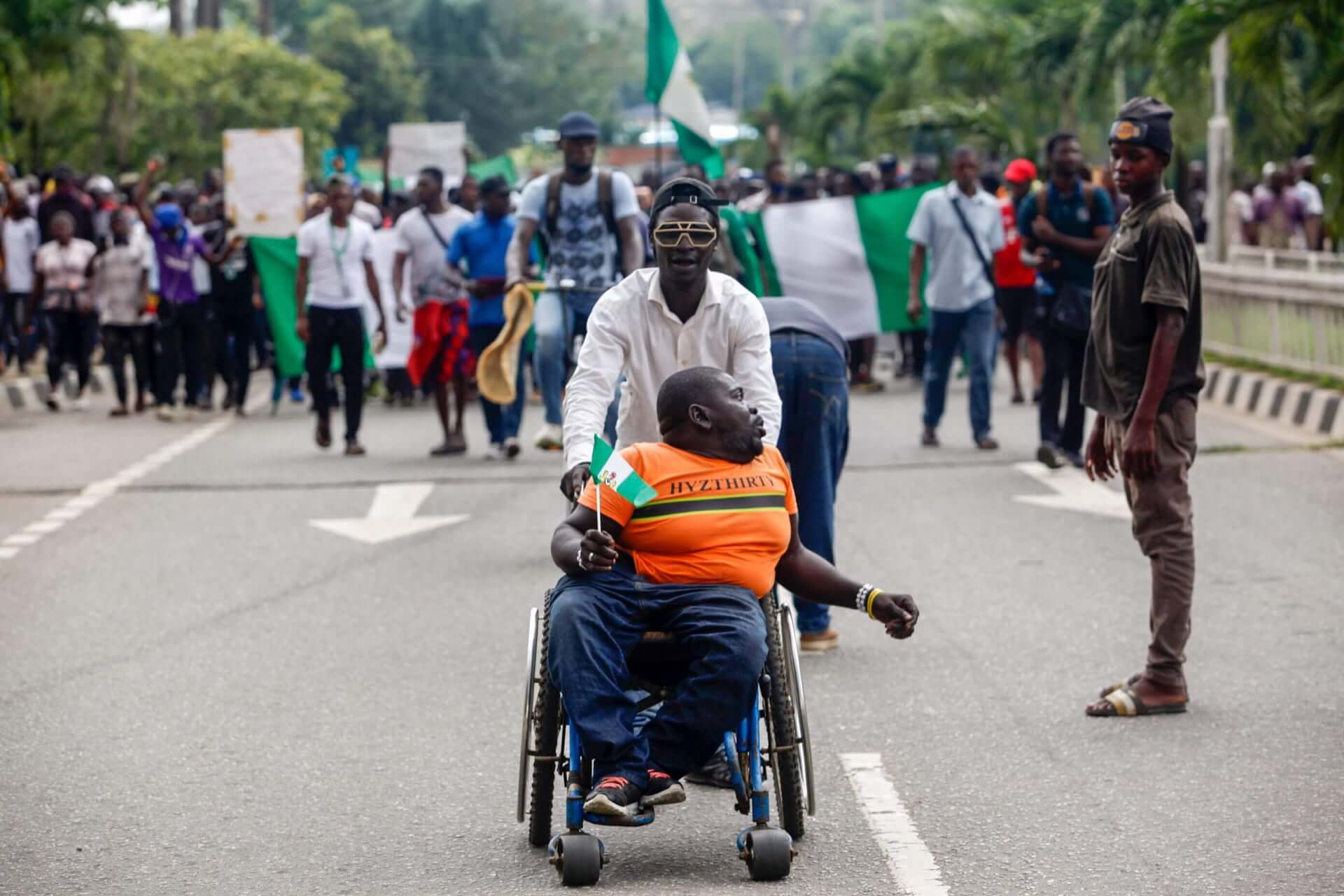
Building a non-motorised future
In 2018, the Lagos Metropolitan Area Transport Authority released a new non-motorised transport (NMT) policy. Its goal is to prevent pedestrian deaths in the state and create a divide between roads and pavements. The core of its intent is to discourage the use of personal vehicles in favour of public transport, cycling or walking.
One of the policy objectives is to include people with disabilities by creating NMT facilities that follow principles of universal design. And by creating a changed culture. It also aims to incorporate ramps, tactile paving and other features at public transport stations to secure access for disabled people. Key to the success of the policy is the $1.4 billion Lagos Rail Mass Transit Plan, launched in 2008 and scheduled for completion in 2022.
But policies in Nigeria have a way of appearing more prominent on paper than in reality. For example, four years after the NMT announcement, many drainages are still uncovered.
OLAJUMOKE ON NO SUPPORT
Despite her success, Olajumoke doesn’t receive any steady financial support from the Nigerian government.
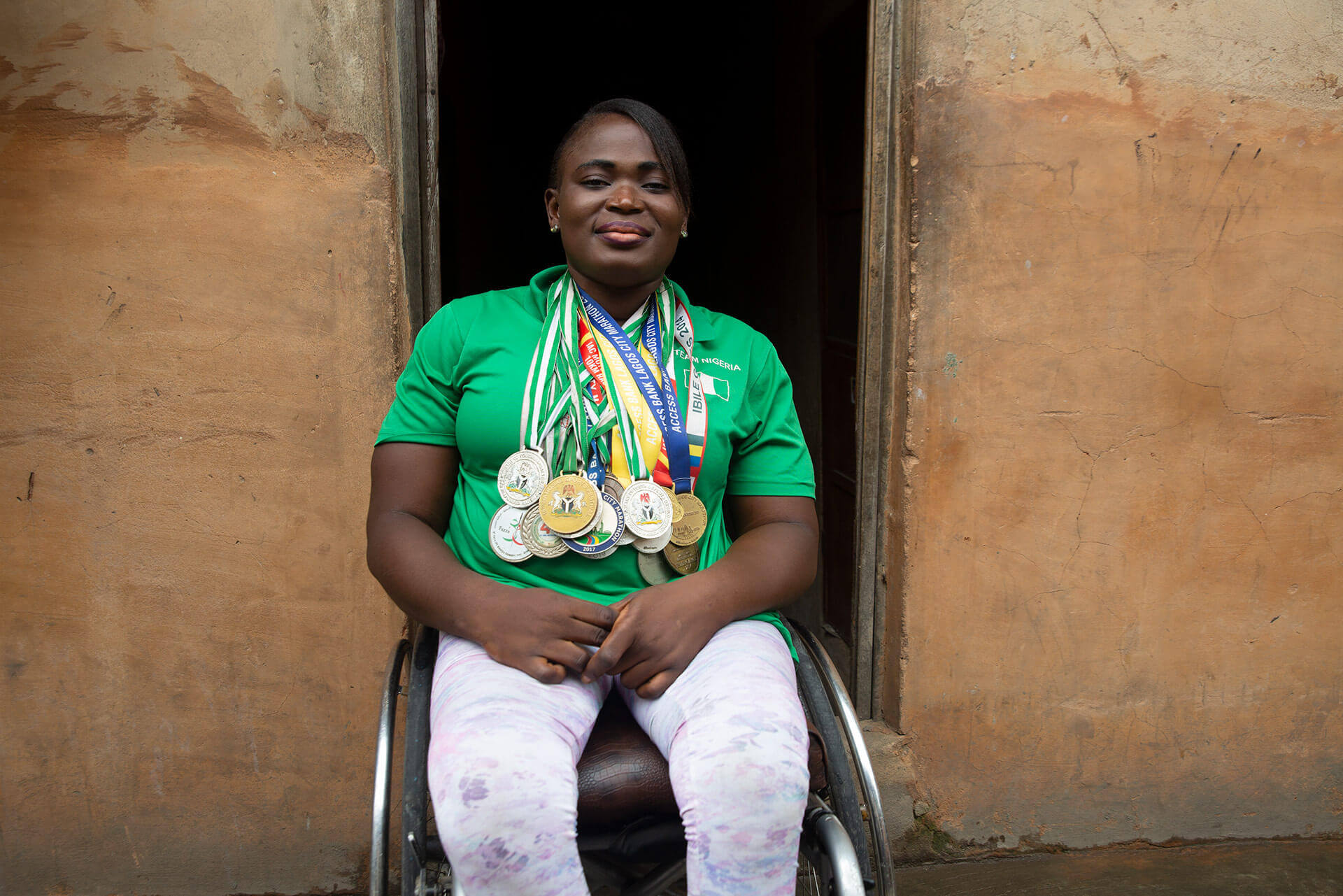
Paralympic athletes are celebrated but not supported
Since Nigeria began sending athletes to the Paralympic Games in 1992, it has won 70 medals. In comparison, since 1952, Nigerian able-bodied athletes have won 25 medals at the Olympics.
Disabled athletes often have to sponsor themselves if they wish to qualify for tournaments. Most of them do not receive grants or monthly stipends for their training and living costs.
The last time Olajumoke received an allowance from the government was in 2016 when she represented Nigeria at the International Paralympic Committee (IPC) Athletics Grand Prix in Dubai. Her dream is to compete in the Paralympics one day.
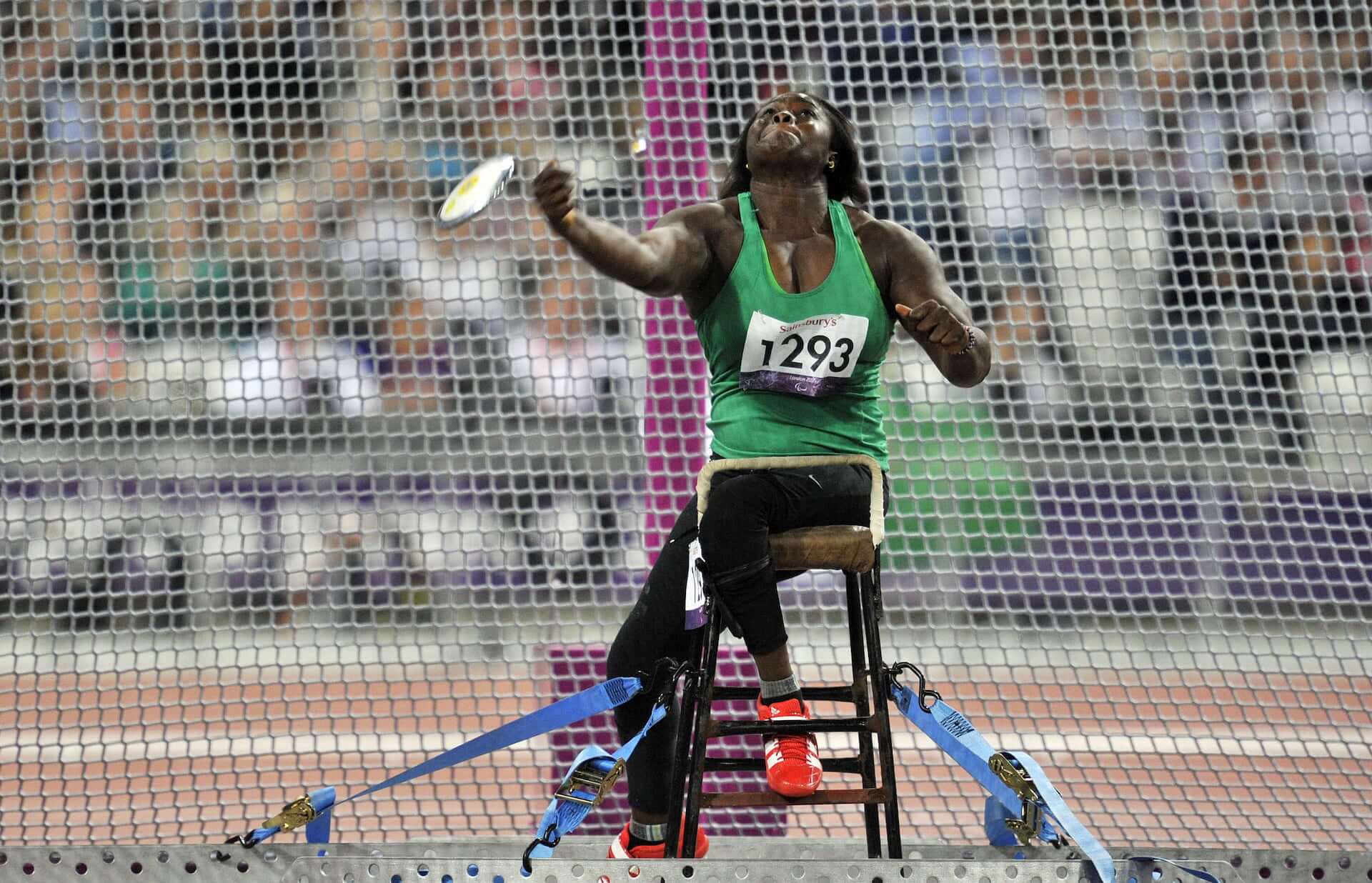
Update
Olajumoke Olajide passed away on Thursday, March 24th, 2022 from an illness related to bedsores. Inaccessible Cities went live in December 2021.
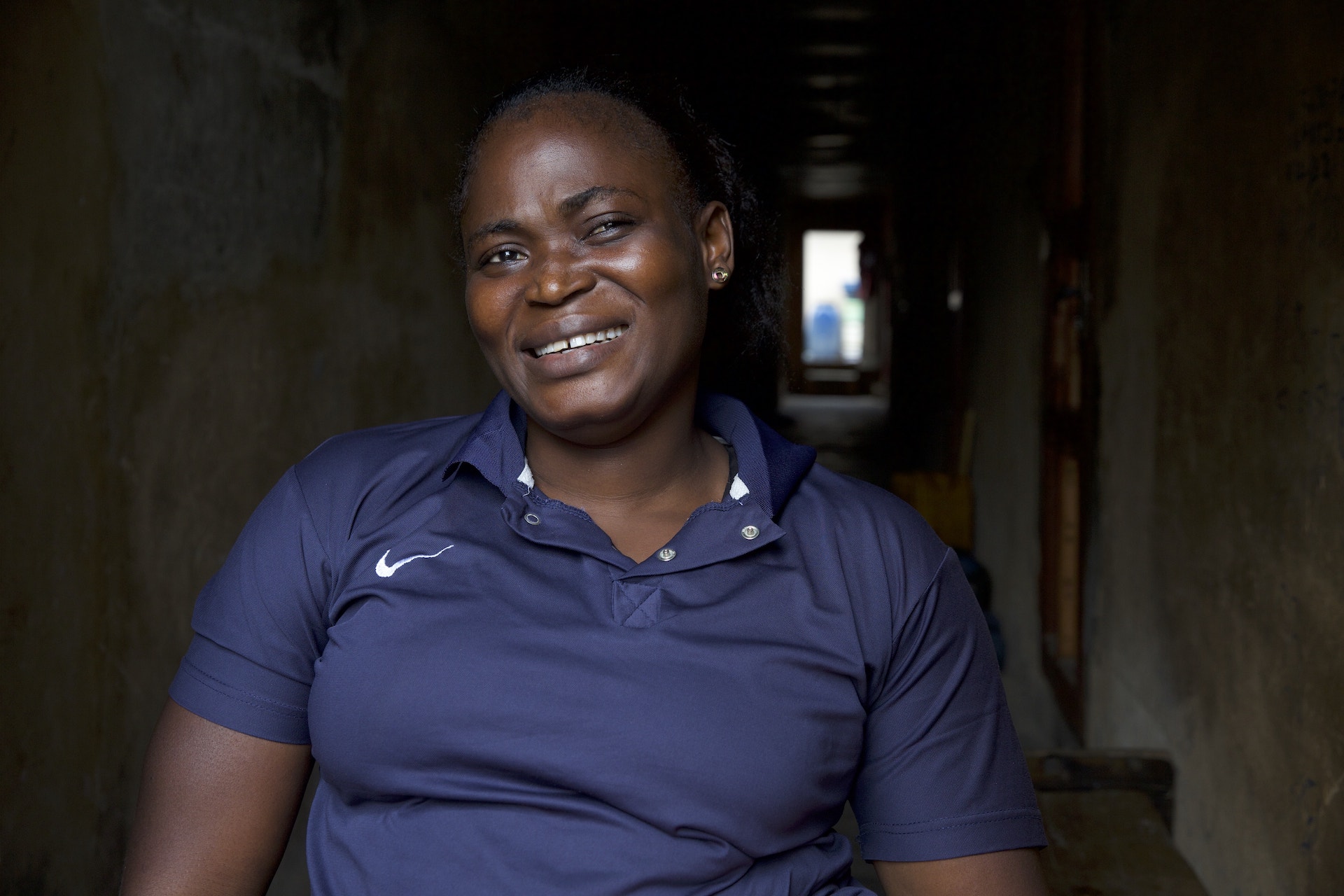
Olajumoke's quote - "My goal in life is to help people with disabilities, especially women. I dream of organising an annual event for disabled people where they can showcase their talents, where they’re entertained and where they’re happy—because this is something we don’t get to experience, unlike able-bodied people."
